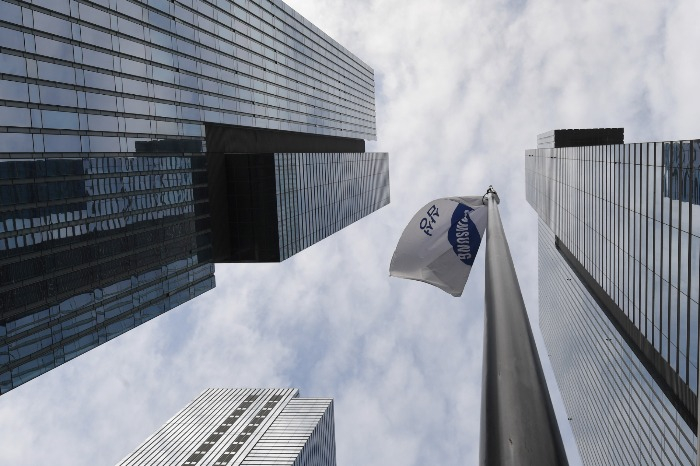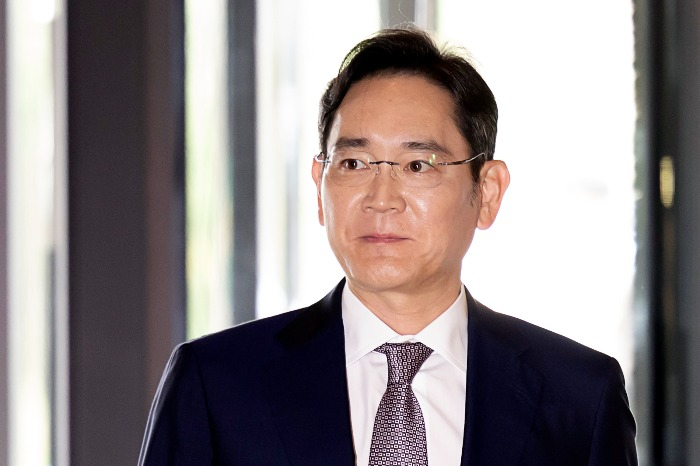Leadership & Management
Samsung Elec joins global 4-day workweek push for work-life balance
The S.Korean electronics giant will allow its employees to work four days a week once a month, not every week
By Jun 12, 2023 (Gmt+09:00)
3
Min read
Most Read
LG Chem to sell water filter business to Glenwood PE for $692 million


KT&G eyes overseas M&A after rejecting activist fund's offer


Kyobo Life poised to buy Japan’s SBI Group-owned savings bank


StockX in merger talks with Naver’s online reseller Kream


Meritz backs half of ex-manager’s $210 mn hedge fund



Samsung Electronics Co. is joining the global four-day workweek move, albeit only partially, under its chief Jay Y. Lee’s leadership that emphasizes flexibility in corporate culture and governance to retain talented employees.
According to industry sources, Samsung Electronics will let its non-factory employees work four days a week once a month starting from this month. Its workers can opt to take a three-day weekend the week on which the company’s monthly pay schedule falls, the 21st of each month.
All employees of both the Device Solutions (DS) and Device Experience (DX) divisions are allowed to take a day off on Friday of the paycheck week every month. The DS will call it Family Day while the DX is promoting it as Development Day.
But only those who can meet the 160- to 168-hour working month requirement are allowed to request the four-day workweek. Samsung workers can also choose to work instead of taking a day off.
Samsung Electronics’ once-monthly four-day workweek comes after its workers’ representative body agreed on the company’s offer during their annual wage negotiations early this year.
WORK-LIFE BALANCE
This move is in line with Samsung Electronics Chairman Lee’s focus to increase flexibility in the corporate culture to retain talented workers and on being an organization that promptly adapts to rapid industrial changes.

The four-day workweek has increasingly become an option across the world as a way to give employees more freedom in choosing work hours for better work-life balance and higher productivity. It has received positive feedback from both employers and employees during trials worldwide.
The industry sources said Samsung Electronics has been reviewing the partial four-day workweek over the past two to three years as flexible working hours have become a global trend since 2020.
Korean startups and information technology companies have already joined the trend and have been wooing skilled engineers with four-day workweek offers, emerging as a strong competitor against the Korean tech giant in the labor market.
The trend has been followed up more closely by young workers, the so-called Millennials and Zoomers, who value a balance between work and personal life.
According to Samsung Electronics, 40% of its employees are such young workers, and they have been calling on the company to adopt the four-day workweek.
Samsung Electronics likely took some cues from its global peers in Silicon Valley such as Google, Apple and Meta that allow their workers more flexible working hours, including a hybrid workweek mode combined with a working-from-home option, than Korean tech companies.
Its foreign rivals evaluate their workers based on individual achievement, not by their total working hours.
It remains to be seen whether Samsung will expand the four-day workweek to the whole month and if more big Korean conglomerates will follow suit.
SK Hynix Inc., CJ ENM Co. and Kakao Games Corp. have already adopted a partial four-day workweek.
Korea is notorious around the world for its long working hours. More than one in 10 Koreans work 60 hours or more per week, twice the Organization for Economic Co-operation and Development average, according to the OECD Jobs Strategy report published by the OECD in August 2020.
The Korean Parliament in 2018 passed a law limiting work to 52 hours a week, based on a standard 40-hour workweek and an additional 12 hours of overtime.
But the new administration under President Yoon Suk Yeol has come up with a reform proposal to expand the maximum amount of overtime an employee can take a week to 29 hours, meaning a maximum workweek of 69 hours.
Some people worry that a flexible working environment may put Samsung Electronics behind in the race against its global peers aggressively seeking to diversify their business portfolios with new growth drivers.
Write to Jeong-Soo Hwang and Ik-Hwan Kim at hjs@hankyung.com
Sookyung Seo edited this article.
More to Read
-
 Culture & TrendsS.Korea's MZers consider income, working time most when job hunting: Survey
Culture & TrendsS.Korea's MZers consider income, working time most when job hunting: SurveyMar 03, 2023 (Gmt+09:00)
1 Min read -
 Leadership & ManagementJay Y. Lee inaugurated as chairman of Samsung Electronics
Leadership & ManagementJay Y. Lee inaugurated as chairman of Samsung ElectronicsOct 27, 2022 (Gmt+09:00)
1 Min read
Comment 0
LOG IN


